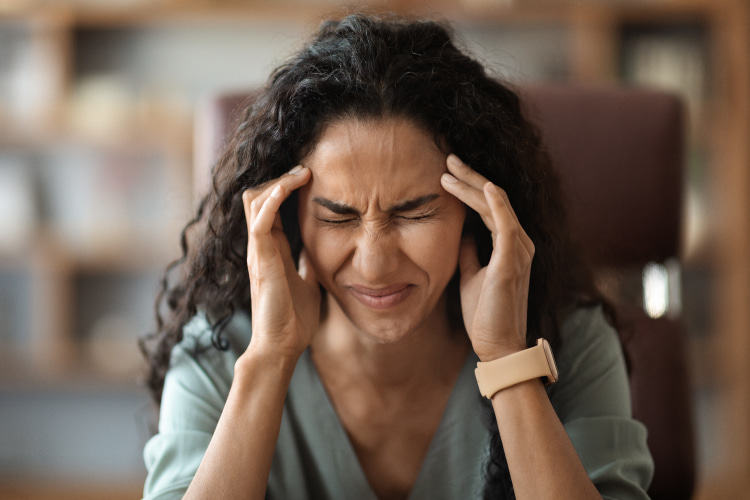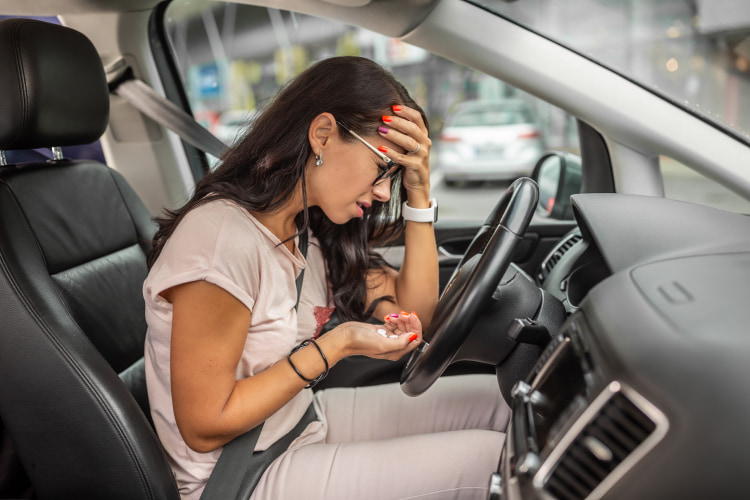After a car accident, it is crucial not to overlook or delay addressing the issue of headaches. You may think of dismissing them as temporary discomfort. Headaches following a collision cause underlying conditions requiring prompt attention. Headaches can be an early warning sign of various conditions, such as:
- whiplash-associated disorders;
- concussions.
They may have long-term implications if headaches after a car accident are left untreated. Even seemingly minor accidents can result in significant forces exerted on the body. It includes the neck and head, leading to potential injuries. Thus, seeking immediate medical evaluation and appropriate treatment is essential for:
- ensuring timely intervention;
- preventing potential complications.
Individuals can focus on their health and well-being. It is possibble by addressing headaches following a car accident. Seeking the necessary care to help a smoother recovery process is a highly essential task.
Common causes of headaches after a car accident
Migraines after a car accident can stem from various causes. They are often related to the impact and forces experienced during the collision. Some common causes include:
- Whiplash. It is one of the most prevalent injuries from car accidents. Whiplash occurs when the head and neck are abruptly jolted back and forth. This sudden movement, which leads to headaches, can strain the:
- neck muscles;
- ligaments;
- nerves.
- Concussion is a head injury caused by a direct blow or violent head shaking. A concussion can result in headaches due to disrupting normal brain function. Headaches associated with concussions can vary in intensity and duration.
- Neck and Spine Injuries. Trauma to the neck and spine can generate radiating pain that manifests as headaches. It can be a hernia or pinched nerves. So a person faces neck pain and headache after a car accident.
- TMJ Dysfunction. TMJ dysfunction can occur if the jaw is hurt during a car accident. TMJ-related headaches often present as pain in the temples or jaw area.
- Post-Traumatic Headaches. These headaches can develop after a car accident. It happens due to the physical and emotional stress endured during the event. They may be tension-type headaches or migraines triggered by the trauma.
It’s important to consult with a healthcare professional for an accurate diagnosis. Doctors provide you with appropriate treatment for car accident headache to address the underlying cause.
Post-Traumatic Headaches
The pain may begin immediately or a week after the injury. In many patients, especially with severe trauma, headaches can be problematic for life. Doctors consider headache to be the chronic phase of post-traumatic headache if:
- the headaches develop within two weeks of the injury;
- persist for over a few months.
Sometimes patients do not experience headaches until several months after a car accident. But usually, headaches begin within hours or days after the injury.
Concussion
Concussion ranks first among all brain injuries after. And it occurs more often in women. Although, maybe they seek professional help more often than men. The brain faces minimal threats as there is no other organ that protects it. Several membranes cover the brain. And a special fluid washes and nourishes it while also serving as a shock absorber. Serious brain problems frequently result from head injuries. All head injuries are open or closed ones:
- Open injuries after car accident headache include:
- the soft tissues of the head (skin, subcutaneous tissue, fascia);
- the damaged skull bones.
- Closed injuries are somewhat less dangerous but still unpleasant.
They, in turn, are also divided into concussion, contusion, and brain compression. Among all brain injuries, concussion ranks first in frequency. And according to traumatologists, it occurs more often in women. Although, maybe they just seek professional help more often than men.
Whiplash
Whiplash is a non-medical term. It describes neck pain following an injury to the neck’s soft tissues:
- ligaments;
- tendons;
- muscles.
This injury results from:
- excessive force overextension followed by sharp flexion;
- sharp flexion followed by extension.
Whiplash injury occurs in traffic accidents, sports, falls, and fights. The term whiplash neck injury was first proposed in 1928. And doctors continue to use it to describe this soft tissue neck injury. And there, we can find a relation between neck pain and headache after a car accident.
The spine is a long column of bones, discs, ligaments, and muscles. It extends from the skull’s base to the tip of the tailbone. The cervical spine supports the head. It protects the nerves and spinal cord, and allows movement. The main supporting structure is the vertebrae. There is a disc between each two vertebrae. At the back of each vertebra are two facet joints, one on each side. The joints shape themselves to allow:
- smooth back-and-forth motion;
- rotation while limiting excessive motion.
The muscles and ligaments surround and support the spine. All these structures have innervation, and pain can result from damage to any of them.
TMJ Dysfunction
Temporomandibular joint dysfunction is a disease that affects the joint itself. Most patients experience this disorder after a car accident and they have headaches. It is most commonly caused by underdevelopment of the upper or lower jaw. It results in malocclusion formation. The disease is linked to improper lower jaw positioning. It leads to various joint blockages. Notably, the TMJ has two joints operating simultaneously. TMJD can cause this condition. Additionally, it can cause:
- microtrauma to the joints;
- dental issues;
- cervical spine pathology;
- headaches after a car accident
- changes in the central nervous system.
And dysfunctions related to internal organ disorders can also lead to this condition. TMJ dysfunction can manifest with or without symptoms. The joint capsule houses the majority of receptors. And the patient’s well-being is affected by dysfunctional symptoms. Common complaints include “clicking” or crunching in the:
- joint area;
- headaches;
- neck pain;
- back pain.
The lower jaw and the joint itself are interconnected with the entire body. As a result, pelvic dislocation and lower jaw dislocation can exhibit similar characteristics. Dysfunction of the sternocleidomastoid muscles can contribute to the improper engagement of muscles. They are responsible for maintaining the correct position of the lower jaw. Additionally, the other things can also contribute to this issue:
- compression of cranial nerves;
- migraines after car accident;
- weakness of the deep flexors of the neck;
- stiffness of the long extensors of the neck .

Why you shouldn’t put off treating a headache after an accident
It is essential not to delay treating a headache after an accident for several reasons. Here are a few key points to consider:
- Hidden Complications. Some injuries may not show immediate symptoms but can worsen over time. You risk exacerbating the condition by delaying treatment and facing more severe consequences.
- Pain Management. Headaches can impact your quality of life causing:
- discomfort;
- difficulty concentrating;
- interfering with daily activities.
Seeking timely treatment can help reduce pain and improve your well-being.
- Preventing Chronic Conditions. You can prevent the development of chronic conditions. It can be chronic headaches or long-term pain syndromes.
- Underlying Injuries. Car accident headache can say underlying injuries. Prompt evaluation by a medical professional is crucial to diagnose and address injuries.
- Legal and Insurance Considerations. Medical attention can also be important from legal and insurance standpoint. Documentation of injuries and treatment support any potential claims related to the accident.
Remember, each accident and its associated injuries are unique. So it is crucial to consult with a healthcare professional for a proper evaluation and a plan.
Chiropractic Treatment for headaches after a car accident
Chiropractic treatment can be an effective approach for managing headaches after a car accident. Chiropractors are healthcare professionals. They specialize in diagnosing and treating conditions related to the musculoskeletal system. It includes the:
- spine;
- muscles;
- joints.
Here’s how chiropractic treatment can help with post-accident headaches:
- Spinal Alignment. Car accidents can cause misalignments in the spine, leading to:
- muscle tension;
- nerve irritation;
- headaches.
Chiropractors use manual adjustment techniques to realign the spine. So it reduces pressure on the affected nerves and promotes proper blood flow.
- Muscle Relaxation. Whiplash and other accident-related injuries can result in muscle tension and tightness. As a consequence, it contributes to migraines after a car accident. Chiropractic treatments like soft tissue therapy and massage can help to:
- relax the muscles;
- relieve tension;
- reduce headache symptoms.
- Targeted Rehabilitation. Chiropractors may prescribe specific exercises and stretches to:
- improve posture;
- strengthen weakened muscles;
- restore mobility.
These exercises can help reduce neck and upper back stress, contributing to headache relief.
- Holistic Approach. Chiropractic care addresses the underlying causes of headaches rather than just symptom management. Chiropractors consider the patient’s overall well-being, providing advice on:
- lifestyle modifications;
- ergonomics;
- self-care techniques to support long-term headache prevention.
Conclusion
In conclusion, when facing the issue of neck pain and headache after car accident, it is crucial to prioritize timely treatment and care. As an expert in neurology and headache management, All Injury Rehab offers specialized services to address post-accident headaches comprehensively. With our experienced team and personalized treatment approaches, including diagnostic evaluations and advanced therapies, All Injury Rehab is dedicated to providing effective solutions and helping individuals recover from their headaches after car accidents. Don’t delay – contact All Injury Rehab for expert care and relief from post-accident headaches today.
FAQ
How long do headaches last after a car accident?
Headaches go away within three months of a head injury. But in more severe cases, the injury may last longer.
What does a headache after a car accident mean?
A headache after a car accident can indicate various underlying injuries or conditions, such as whiplash, concussion, neck or spine trauma, or muscle tension. It should be evaluated by a medical professional for proper diagnosis and treatment.
How do you know if a head injury is serious?
You have vomiting, irritability, or drowsiness lasting more than 6 hours. You may also lose consciousness.
What kind of doctor helps with car accident injuries?
Healthcare professionals commonly include emergency room physicians, orthopedic surgeons, neurologists, chiropractors, physical therapists, and pain management specialists.


Related posts
Today is an era dominated by digital conveniences and desk-bound occupations. So, the effects of a sedentary lifestyle have emerged as a pervasive concern.
Our guide aims to equip people with the knowledge to understand the intricacies of internal injuries. They are arising as a result of car accidents. Join us on this informative trip.
Beyond merely treating injuries, chiropractors work to enhance the body's biomechanics. It allows sportsmen to move more potently and reduces the risk of future injuries.